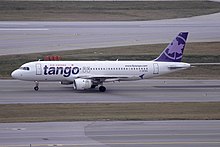| Revision as of 15:16, 17 April 2020 editWikiCleanerBot (talk | contribs)Bots926,203 editsm v2.02b - Bot T12 - WP:WCW project (Punctuation in link)Tag: WPCleaner← Previous edit | Revision as of 16:10, 29 June 2020 edit undoJessicapierce (talk | contribs)Extended confirmed users113,079 editsm minor copy editsNext edit → | ||
| Line 38: | Line 38: | ||
| ]]] | ]]] | ||
| ]]] | ]]] | ||
| Air Canada Tango's fleet consisted of ] and ] aircraft. The Boeing 737-200 were added to the fleet in 2002, but most left the fleet in late 2002/early 2003, being moved to another ] subsidiarity, ], which retired them in 2004. The Airbus A320 stayed in Tango's fleet until they ceased operations, with |
Air Canada Tango's fleet consisted of ] and ] aircraft. The Boeing 737-200 were added to the fleet in 2002, but most left the fleet in late 2002/early 2003, being moved to another ] subsidiarity, ], which retired them in 2004. The Airbus A320 stayed in Tango's fleet until they ceased operations, with four moving to ], and the rest moving to the ] mainline fleet.<ref name="planespotters.net">{{cite web |title=Air Canda Tango Fleet Details and History |url=https://www.planespotters.net/airline/Air-Canada-Tango |website=planespotters.net |accessdate=2 September 2018}}</ref> | ||
| <center> | <center> | ||
| {| class="toccolours" border="1" cellpadding="3" style="border-collapse:collapse" | {| class="toccolours" border="1" cellpadding="3" style="border-collapse:collapse" | ||
| |+ '''Air Canada Tango |
|+ '''Air Canada Tango fleet''' | ||
| |- bgcolor=purple | |- bgcolor=purple | ||
| ! style="color:white;"|Aircraft | ! style="color:white;"|Aircraft | ||
| Line 66: | Line 66: | ||
| * ] | * ] | ||
| * ], low-cost subsidiary of Air Canada | * ], low-cost subsidiary of Air Canada | ||
| * ], destination of some of the Air Canada Tango Airbus A320- |
* ], destination of some of the Air Canada Tango Airbus A320-200s | ||
| * ] | * ] | ||
Revision as of 16:10, 29 June 2020
 | |||||||
| |||||||
| Founded | October 2001 | ||||||
|---|---|---|---|---|---|---|---|
| Commenced operations | November 1, 2001 | ||||||
| Ceased operations | 2004 | ||||||
| Parent company | Air Canada | ||||||
| Headquarters | Montreal, Quebec | ||||||
| Website | Flytango.com | ||||||
Air Canada Tango was a low-cost subsidiary branch of Air Canada, which was established in 2001 to offer no-frills service on some of Air Canada's routes and to reduce operating costs at the struggling main company. Based in Toronto, Tango operated on the major longer-distance Canadian routes between cities such as Toronto, Ottawa, Montreal, Calgary and Vancouver, as well as to some holiday destinations in the USA and Mexico such as Fort Lauderdale, Seattle, Tampa and Mexico City.
The airline's name is short for "Tan and Go", which is in reference to the southern winter destinations that it had planned to serve.
History
The airline was launched in October 10, 2001, with tickets becoming first available for purchase on October 11, 2001. Tango commenced operations on November 1, 2001 with a fleet of Airbus A320 and Boeing 737-200 aircraft, offering fares of up to 80% off full-fare economy Air Canada fares. One innovation of Air Canada Tango was the requirement of electronic tickets, saving on ticket costs.
By 2004 the airline had ceased flying. After being consolidated into Air Canada, Tango's website- flytango.com- redirected to Air Canada's website, but as of September 2018 is offline.
Air Canada retained "Tango" as a brand name for its cheapest air fare category. Air Canada later revived the leisure-oriented "airline within an airline" concept as Air Canada Rouge in 2012, an airline that is still flying today.
Fleet


Air Canada Tango's fleet consisted of Airbus A320-200 and Boeing 737-200 aircraft. The Boeing 737-200 were added to the fleet in 2002, but most left the fleet in late 2002/early 2003, being moved to another Air Canada subsidiarity, Zip, which retired them in 2004. The Airbus A320 stayed in Tango's fleet until they ceased operations, with four moving to Air Canada Jetz, and the rest moving to the Air Canada mainline fleet.
| Aircraft | Number | Passengers (Economy) |
Notes |
|---|---|---|---|
| Boeing 737-200 | 9 | 117 | 7 moved to Zip in late 2002/early 2003 |
| Airbus A320-200 | 12 | 159 | 4 moved to Air Canada Jetz, 8 moved to Air Canada after Tango ceased operations |
Air Canada Tango aircraft were configured in a full economy class layout rather than with a business class section as on regular Air Canada aircraft and featured a distinctive purple colour scheme.
See also
- Air Canada
- Zip, low-cost subsidiary of Air Canada
- Air Canada Jetz, destination of some of the Air Canada Tango Airbus A320-200s
- List of defunct airlines of Canada
References
- "What's Tango?". Tango by Air Canada. Archived from the original on 9 August 2003. Retrieved 2 September 2018.
- ^ "TANGO BY AIR CANADA OFFERS LOW FARES, NO RESTRICTIONS AND CONVENIENT SCHEDULE". Tango By Air Canada. Archived from the original on 22 June 2003. Retrieved 2 September 2018.
- ^ "Applying rouge". Airliner World: 88–96. March 2015.
- meet Air Canada rouge. aircanada.com, Retrieved 2 September 2018.
- "Air Canda Tango Fleet Details and History". planespotters.net. Retrieved 2 September 2018.
External links
- Official website at the Wayback Machine
| Air Canada | |||
|---|---|---|---|
| History | |||
| Accidents and incidents |
| ||
| Services | |||
| Subsidiaries |
| ||
| Hubs |
| ||
| People |
| ||
| Loyalty programs | |||
| Merged airlines | |||